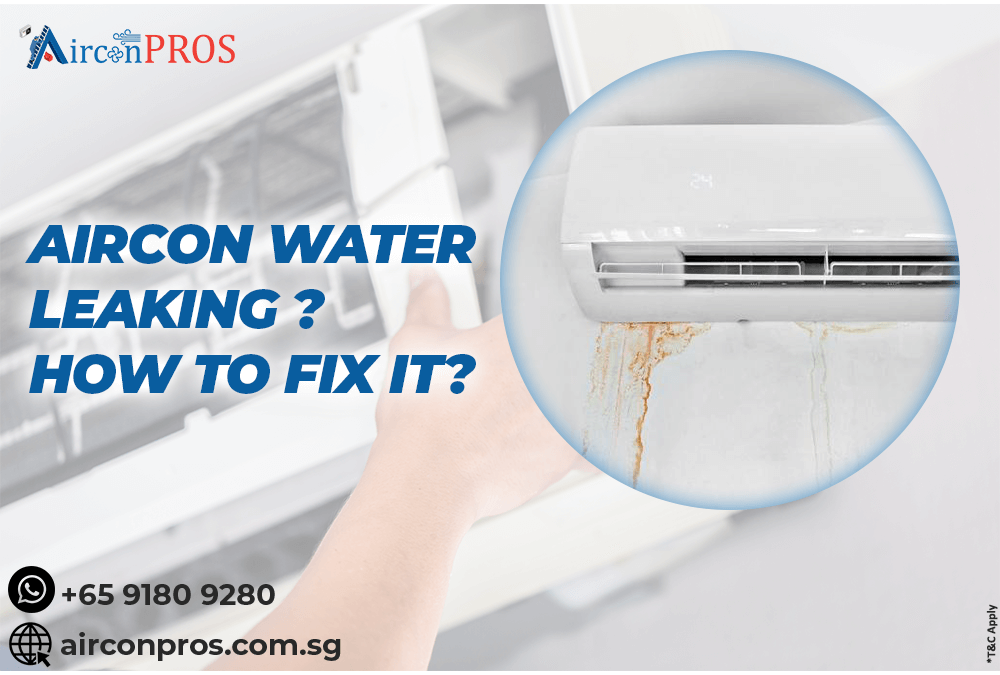
Air conditioning units are designed to cool and dehumidify the air in a room or building Aircon water leaking. As the air conditioner runs, it produces condensation, which is drained away through a drain line. However, if you notice that your air conditioner is dripping water, it could be a sign of a problem. There are several reasons why your air conditioner may be leaking water, including:
Clogged condensate drain line:
Over time, dirt, dust, and other debris can accumulate in the drain line and cause it to clog. This blockage can cause water to back up and overflow from the drain pan, resulting in a water leak.
Dirty air filter:
If the air filter in your air conditioner is dirty or clogged, it can restrict the flow of air and cause the evaporator coil to freeze. When the ice melts, it can result in water overflowing from the drain pan.
Damaged condensate pan:
The condensate pan in your air conditioner collects the water that drips from the evaporator coil. If the pan is damaged or rusted, it can cause water to leak from the unit.
Refer: Top 5 reasons why your aircon is not cold in your room?
Low refrigerant levels:
If the refrigerant levels in your air conditioner are low, it can cause the evaporator coil to freeze and overflow the condensate pan.
Improper aircon installation: If your air conditioner was not installed correctly, it can cause water to leak from the unit.
Book an Appointment Call or What’s app: +65 91809280
Now that we understand the potential causes of a leaking air conditioner, let’s discuss how to stop the leakage:
HOW TO FIX IT
- Turn off the air conditioner: The first step is to turn off the air conditioner and unplug it to prevent any electrical hazards.
- Locate the drain line: Locate the drain line and check if it is clogged. If you can’t find the drain line, refer to the air conditioner manual.
- Unclog the drain line: Use a wet/dry vacuum to suction out any debris from the drain line. If this doesn’t work, you can use a long, thin brush or a wire hanger to gently remove the blockage.
- Clean the drain pan: Once the drain line is unclogged, clean the drain pan with a mixture of warm water and soap to remove any dirt or mold.
- Replace the air filter: If the air filter is dirty or clogged, replace it with a new one. This will improve airflow and prevent the evaporator coil from freezing.
- Check the condensate pan: Inspect the condensate pan for any damage or rust. If it is damaged, it may need to be changed.
- Check refrigerant levels: If the refrigerant levels are low, it may be necessary to call a professional technician to recharge the system.
- Call a professional: If the problem persists, or if you are unsure about how to fix the issue, it is best to call a professional air conditioning technician to inspect and repair your unit.
Regular aircon service can also prevent water leakage from occurring. Professional technicians can perform routine maintenance, such as cleaning the air filter and inspecting the condensate drain line, to ensure the system is functioning correctly. They can also detect and address problems before they become severe, preventing water leakage and other issues with your aircon unit.
In conclusion, if your aircon is leaking water, it is essential to take steps to stop the leakage to prevent further damage to your unit. Whether it be a simple fix like cleaning the condensate drain line or a more complex issue requiring professional aircon repair services, addressing the problem promptly will help ensure your air conditioning unit is functioning efficiently and prevent costly repairs in the future. Regular aircon service can also help prevent water leakage and other issues with your aircon unit, so it’s important to schedule routine maintenance with a professional technician.
Regular maintenance of your air conditioner, including cleaning the air filter and checking the drain line, can help prevent future water leaks. It is also important to have your air conditioner serviced regularly by a professional technician to ensure that it is operating efficiently and effectively.

